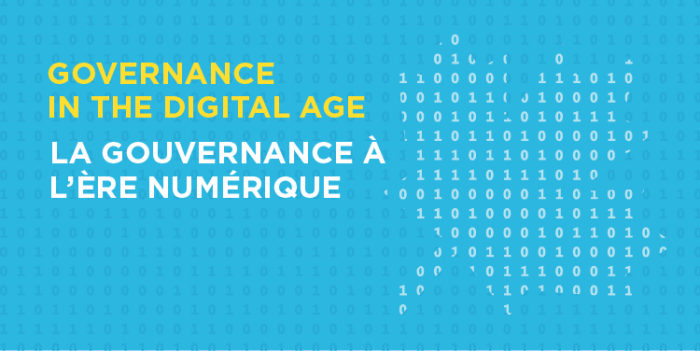
Four strategies governments can adopt to manage change in the digital age
In 2017, the Public Policy Forum dedicated its annual Prime Ministers of Canada Fellowship to the idea of governance in the digital age. The goal was to explore and explain how the world is changing and how governments are responding. Kent Aitken won that Fellowship and wrote a report that practitioners can use as a resource as they contemplate the pressures of change on governance systems. Governance in the Digital Age is the result of a year of research, surveys and interviews with about 300 government practitioners and stakeholders in Canada and around the world.

By Kent Aitken
Governments have been hearing for decades about how they should change to keep pace with an increasingly digital society. We hear words like “agile”, “connected”, “responsive”, “user-centric”, “open” and “innovative.” We hear that the world is increasingly complex, or that the rate of technological progress is too fast for governments to keep up, so governments need to change fundamentally.
During my research, I heard two competing analyses. One is that the structures and designs of government aren’t set up for digital-era governance. The other is that our public governance has been reasonably effective in the digital age; Canada’s civil service has been ranked as the most effective in the world, and we can find some stellar success stories for digital transformation and open government.
A year of research and interviews suggests that the first hypothesis is true, and that governments are changing only at the surface – rarely at their foundations. This could be because we are misdiagnosing the problem, coming up with the wrong solutions or failing to implement solutions correctly.
So what can be done? Governments need to embrace complexity and invest far more in skillsets and systems designed to adapt constantly to unknowable futures.
As it stands, initiatives to transform governance across jurisdictions rely on a web of workarounds, fast tracks and exemptions. Interviewees told stories of progress in digital transformation followed by backslide. Sometimes, the departure of one key official was enough to derail a whole program.
Meanwhile, executives were often unaware of the challenges coming with their transformation initiatives, disconnected from the day-to-day experience of both employees and the citizens on the user end of services and programs.
What, then, can governments do?
If the problem is to become more contextual to individuals’ needs, governments must delegate down and push decision-making to the front lines. However, if the problem is horizontality and coordination between organizations, governments must make sure that information and decisions flow through central nodes. If the problem is to understand the changing technological and societal context, governments must become facilitators and conveners by leveraging external expertise. On the other hand, if the problem is to exercise stewardship of the public good, governments must improve internal capacity to develop policy.
Put differently: there are no certain solutions, only choices. But there are proven and promising approaches for reliably making good choices over time in new and changing contexts. In 2007, the Crossing Boundaries working group declared that “governments must stop trying to plan for things they cannot know and focus instead on learning to manage change.”[2] To support that goal, my report recommends that governments invest in four complementary strategies.
1.Process skills
Organizational learning doesn’t happen on its own. In an era that lacks playbooks, maps and right answers, it is crucial to build process skills that help organizations navigate unfamiliar territory. Examples include user experience researchers and designers, foresight specialists and citizen-engagement practitioners; the common thread is that these roles all support organizational decision making. This is how organizations map systems, understand complexity and collaboratively imagine and pursue future states based on a common mental model.
Organizations have always struggled to deploy process skills effectively. Almost every team needs them sometimes, but almost no teams need them full time. Leaving the decisions these groups typically make to time- and resource-strapped teams in government has never worked well. Governments have to make investments that actively build process skills and make them available across organizations.
2. Subject matter expertise
A common theme from my research was that governments can’t throw generalists at problems in specialized fields and expect solid outcomes. Optimists (typically profit-motivated) tend to drive the discourse about technological change; those who believe in the value of an emerging technology are those who will invest, develop and experiment. Academics and public sector voices follow years behind, only once the technology starts generating societal or economic impacts.
Attending a one-day conference on artificial intelligence doesn’t scratch the surface for the understanding required to consider impacts on governance. Governments need to take specialized expertise far more seriously, including knowing what expertise is needed in the first place. For rapidly changing fields, this means that learning and community engagement will have to become a core part of people’s jobs and day-to-day time – not an occasional refresher.
3. Protecting the public good in a fast-paced world
A common theme from my interviews and other recent research is that the digital era changes the working context for public officials, putting tension on fundamental principles of public service. In a slow-moving world, principles about public governance and the roles of public servants – the “public service ethos” – become embedded in policies and processes over time. But in a dynamic, fast-moving world like ours, officials must constantly apply principles to new contexts; and they must understand the principles and the contexts at a deep level.
During my research, the interviewees told me about the need to leverage new possibilities and approaches, such as crowdsourcing, digital engagement, social media, artificial intelligence, challenge prizes, platform models and so on. But some important questions remain: Do the people who understand the public good understand how the world is changing? Do the people who understand how the world is changing understand the public good?
The section just above on subject matter expertise begins to answer the first question. For the second, governments have to find ways to emphasize, communicate and reinforce principles for the public sector role in a digital age. Relying on process and rigid rules will fail more and more in a world where context is so important.
4. Transparency and openness
Transparency and openness are critically important because they support collaboration and create an honest accounting of successes and challenges across an organization. To be a node in a larger collaborative network, governments need to be open and transparent about the data and information they’re working from, and the rationales for their decisions.
A major problem for digital-era transparency and openness is that nobody has a landscape view of government – especially those most responsible for structural governance decisions. The interviewees told me how hard it is for the right people in organizations to gain a complete understanding of users’ day-to-day experiences, including users’ frustrations using websites and the unintended consequences of analog-era policies. When governments spend time watching users interact with a service they can use the information to develop better design and build more design-oriented organizations. This is important because accountability tends to be called upon only when a project fails spectacularly it doesn’t come into play for citizens’ ongoing frustrations unless the frustration is captured, tracked and reported online.
Governments need to get used to being wide open about progress. The goal is a landscape view of the issues to underpin goal-setting and constant adjustment, increasingly in the public eye and with partnerships across organizational and sector lines.
Change is more than “challenging”
Progress in digital governance is inevitable. What’s not inevitable is that we will ever get the exact progress we want, with the pace, scale and impact we want. Governments are currently struggling with change, and it’s not going to get any easier.
We hear that government transformation – as applied to open government, digital government, public sector innovation and technological disruption – is “challenging”. But that makes it sound like we can realize deep transformation with a little legwork and elbow grease. In reality, the word “challenge” drastically undersells the level of investment and commitment needed.
The problems facing governments require substantial governance levers at the level of laws and institutions, and genuine discussions about the nexus of accountability, expertise and responsibility. Governments have to solve problems with an approach that is more holistic, more contextualized to peoples’ needs and that reflects more voices.
To do less is to decide to muddle through indefinitely. My report sheds some light on the steps governments can take to do more than that.
About the Author
 Kent Aitken joined the federal public service in 2009 to work in public policy, but has often been drawn toward roles that examine the systems in which policy gets made. He’s spent the last few years working on accountability, transparency and citizen engagement to redefine the relationship between citizens and their government.
Kent Aitken joined the federal public service in 2009 to work in public policy, but has often been drawn toward roles that examine the systems in which policy gets made. He’s spent the last few years working on accountability, transparency and citizen engagement to redefine the relationship between citizens and their government.
As the Public Policy Forum’s 2017 Prime Ministers of Canada Fellow, Kent dedicated a year to understanding governance in the digital age. His report, summarized here, is the result of research, surveys and interviews with almost 300 government practitioners and stakeholders in Canada and around the world.
Kent has a degree in Business Administration from St. Francis Xavier University, a degree in Political Science and Economics from the University of Prince Edward Island, and a Master of Science degree in Environmental Economics from the University of London, UK.





